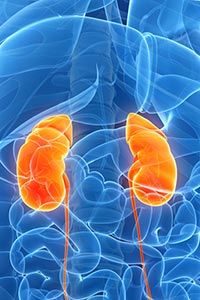Kidney Disease

Normal, healthy kidneys filter about 200 quarts of blood each day, generating about 2 quarts of excess fluid, salts, and waste products that are excreted as urine. Loss of function of these organs, even for a short period of time or due to gradual deterioration, can result in life-threatening complications. Loss of kidney function is an important health challenge whether it occurs suddenly or over a long period of time.
The NIDDK supports basic and clinical research on kidney development; the causes of kidney disease; reducing kidney health disparities; the underlying mechanisms leading to progression of kidney disease; and the development and testing of possible treatments to prevent or slow progression of kidney disease. Also of interest are studies of inherited diseases such as polycystic kidney disease, congenital kidney disorders, and immune-related kidney diseases such as IgA nephropathy and hemolytic uremic syndrome.
It has been estimated that 35.5 million American adults have chronic kidney disease (CKD). CKD has two main causes: high blood pressure and diabetes. CKD, especially if undetected, can progress to irreversible kidney failure. People with kidney failure require dialysis or a kidney transplant to live. Minority populations, particularly African Americans, Hispanic and Latino Americans, and American Indians and Alaska Natives, bear a disproportionate burden of CKD and kidney failure.
In addition, NIDDK has congressional authorization for the National Kidney and Urologic Diseases Information Clearinghouse, which provides services via the NIDDK Health Information Center. NIDDK responds to questions and provides health information about kidney disease to people with kidney disease and to their families, health professionals, and the public.
Research Updates and News
- Genomic variants that increase risk of kidney disease are found in nearly one-third of West Africans
- Scientists discover potential treatment approaches for polycystic kidney disease
- Alternatives to Race-Based Kidney Function Calculations
- New atlas of human kidney cells to help unlock kidney disease research
- Being hospitalized with acute kidney injury may increase risk for rehospitalization and death
Select Landmark Studies
- Chronic Kidney Disease in Children Study: CKiD
- Effects of Chronic Kidney Disease in Adults Study: CRIC
What We Do
To achieve its mission, NIDDK supports, conducts, coordinates, and plans research. NIDDK also provides data and samples from NIDDK-funded studies and explains research findings to health professionals and the public.
Support Research
NIDDK invests in basic, clinical and translational research and training at colleges, universities and other institutions.
- Acute Kidney Injury
- Chronic Kidney Disease
- Diabetic Kidney Disease
- End-Stage Renal Disease
- Kidney Bioengineering, Biotechnology, and Imaging
- Kidney Clinical Research and Epidemiology
- Kidney Developmental Biology and Aging
Conduct Research
NIDDK investigators conduct biomedical research and training in the Institute's laboratories and clinical facilities in Maryland and Arizona.
View all Labs & BranchesCoordinate & Plan Research
NIDDK takes multiple approaches to research planning and priority setting.
Meetings & Workshops
View all Meetings & WorkshopsStrategic Plans & Reports
- NIDDK Strategic Plan for Research
- U.S. Renal Data System
- Kidney Research National Dialogue (KRND) Summary
Provide Access to Research Resources
NIDDK makes publicly supported resources, data sets, and studies available to researchers.
View all Research ResourcesProvide Health Information
NIDDK provides patient education information, practice tools for diagnosis and treatment, and statistics.

